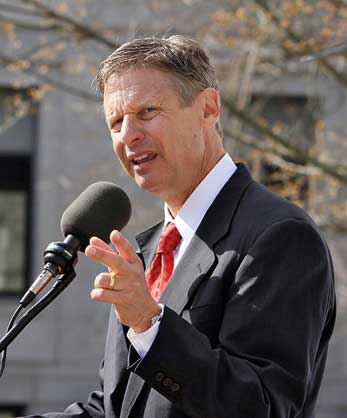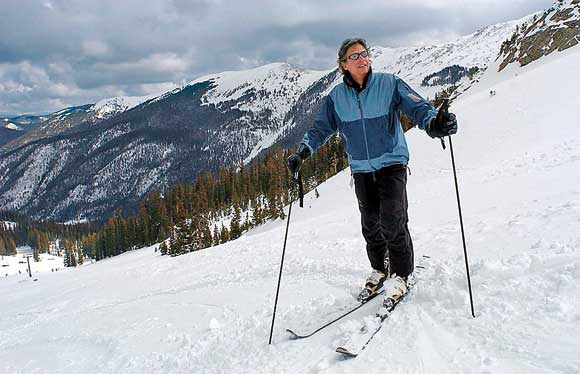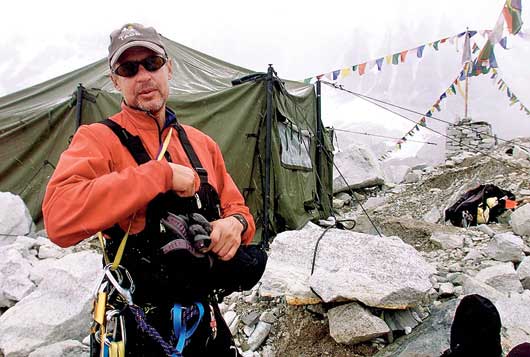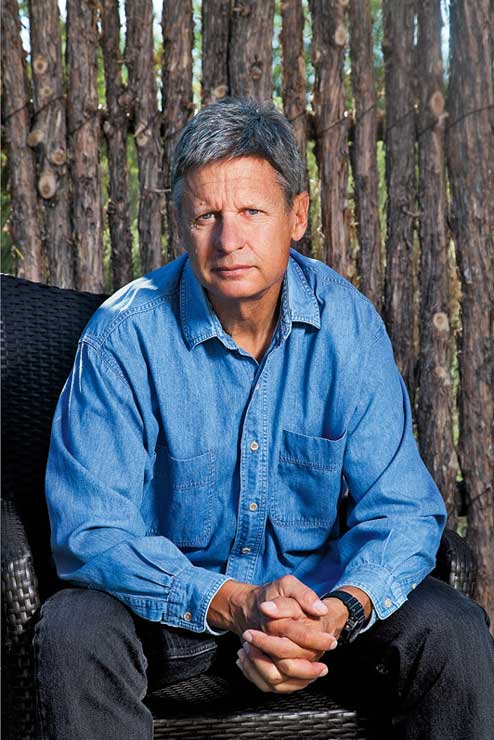Failure to Launch
Despite a stellar record of spending cuts, job creation, and balanced budgets—and a world-class adventure résumé that includes an Everest summit—former New Mexico governor Gary Johnson can't get anyone to take his campaign for president seriously. Is it him or us?
New perk: Easily find new routes and hidden gems, upcoming running events, and more near you. Your weekly Local Running Newsletter has everything you need to lace up! .
Gary Johnson, the darkest horse in the 2012 Republican presidential field, has spent most of his adult life setting outrageously ambitious goals and then systematically plodding away until he attains them. After graduating from the University of New Mexico in 1975, he grew his one-man fix-it business into a 1,000-employee commercial construction company, Big J Enterprises. In 1993, with no political experience, he launched a campaign for governor of New Mexico—a state then dominated by Democrats—and won. Back-to-back terms. Before assuming his gubernatorial duties, he trained for and finished the 1993 Ironman Hawaii, his first of five such races. In 2003, shortly after he was term-limited and left office, he summited Mount Everest.
Last April, Johnson, 58, announced the latest item on his bucket list: becoming the 45th president of the United States. Johnson reentered the fray from so far outside the Republican establishment that even many elected officials didn’t know who he was. If people recognized him at all, it was likely because Johnson had made national headlines in 1999 for publicly supporting marijuana legalization, one of the highest-ranking officials ever to do so. At the time, many insiders, including Johnson himself, believed this marked the end of his future in politics. Big J jokes ensued. His top law-enforcement officer quit. Within days Johnson’s approval rating plummeted from the high fifties to less than 30 percent. Barry McCaffrey, President Clinton’s drug czar, jumped on a plane, flew to New Mexico, and called a press conference to denounce the governor’s position, referring to him as “Puff Daddy Johnson.”
Did Puffy care? Not so much. What motivated that political risk was the same calculated pragmatism that drove him back into politics nearly ten years later. He considers himself “an entrepreneur and a problem solver,” not a career politician. As governor, he often says, he had “looked at everything through a cost-benefit basis”—and the war on drugs had come up woefully short.

Fast-forward to the end of 2008 and the onset of the Great Recession. Johnson couldn’t stomach sitting on the sideline as America’s economic predicament worsened by orders of magnitude. In the fall of 2009 he helped found a nonprofit, the Our America Initiative, and spent the next 18 months protostumping his libertarian platform (“The best government is the one that governs least”) to Rotary clubs, Tea Partiers, and free-market businessmen. “I felt like everything Obama and his administration did was wrong,” Johnson told me. “And no one on the Republican side was doing anything different. I’m not running against Obama; I’m running against the status quo.”
On April 21, mindful to avoid the druggy overtones of 4/20, Johnson stood in front of the New Hampshire State House in Concord on a breezy morning and announced his candidacy. His first priority, he told the crowd of 50 or so folks, many of them bored-looking camera techs, was fixing the economy. He promised to balance the budget his first year in office, committing to drastic cuts in defense spending and reforming Social Security, Medicare, and Medicaid. His second priority was to stop elected officials from mucking with our private lives. “Let’s get government out of the bedroom,” he said. At one point, a stiff wind nearly knocked over the large banner behind him, which read “The People’s President: When Gary Johnson Goes to Washington, Everybody Goes.”
A few days later, I joined Johnson and a handful of supporters and donors (dubbed Gary Johnson’s Mountaineers) for a ski expedition to Mount Washington’s Tuckerman Ravine. The outing was billed as a media event; what better way to showcase the “Johnson narrative” than by inviting reporters to watch him tackle one of the toughest backcountry slopes in New England? But the weather was unseasonably cold, with heavy snow and high winds, and perhaps because Mount Washington is notorious for killing people—usually by hypothermia but also from avalanches or the occasional skier pinwheeling over an ice cliff—I turned out to be the only media present. (To be fair, one guy from New Hampshire Public Radio showed up, but he bailed about a third of the way up the trail.)
By the time we were climbing Tucks’s intimidating 800-foot headwall, our party had dwindled to four: Johnson and me, plus supporters Ryan Hunter, who is a competitive freeskier from Utah, and Mike Babcock, a lawyer who’d driven up from Brooklyn, New York, the day before and slept in his car at the trailhead. We ascended single file, ice axes in hand, in a frozen gully that was so steep I could look up and see Johnson’s boot soles.
The descent was worse. We made our way over to a vertiginous 50-degree run called the Lip, which one guidebook describes as “the classic test piece at Tucks.” The wind had scoured the snow off the face, revealing the unsettling linoleum glint of ice below. A slip here would send us hurtling into Lunch Rocks, a boulder field 500 feet down that looked like a shark’s open mouth. I probably would have backed off right then were it not for the voice in my head reminding me that if, by some miracle, Johnson made it to the White House, I’d never live it down.
I traversed the top, Ginsuing my edges into the rock-hard surface, worried that this was about to become the briefest campaign in the history of presidential races. But Johnson was already far below, arcing confident turns toward a few Mountaineers who’d made it up to the ravine and sat shivering next to a large rock. Later, still jittery with adrenaline, I rode back to town with Johnson and asked if he thought his enthusiasm for extreme sports transferred to the campaign trail.
“Oh, completely,” he said. “It’s how I measure myself. It gives me my edge.”
If it seems strange to be reading about an obscure back-of-the-packer so close to 2012’s decisive early primaries, consider that Johnson’s current standing may have less to do with the player than the game. It’s true that even back in April, you’d have been hard-pressed to find a single pundit or political handicapper who would give Johnson a powder skier’s chance in hell of getting the nomination. “I’m sure it’s nice to think that there is some way he could become relevant,” says Alex Castellanos, a Republican strategist and frequent CNN contributor. “But there’s no way that’s going to happen. Johnson is the Pluto of Republican political planets. He’s just too far out there to sustain life.”
Yet to a small, impassioned contingent of Mountaineers, Johnson’s lack of traction has been maddening. At the outset, they viewed Johnson as the next Ron Paul, a younger and more electable version of the 76-year-old Texas congressman who surprised the field in 2008 and whose libertarian views often overlap with Johnson’s. Paul supporters are so zealous that they’re sometimes called Paulbots. In the early going, the Mountaineers looked forward to welcoming the Paulbots to their ranks and giving Johnson’s run some significant heat. That is, until May,
Johnson's CV includes Ironmans, ultramarathons, and high-altitude mountaineering. Let's pause for a moment to imagine Mitt Romney skiing Tuckerman Ravine.
when Paul himself jumped into the ring and all but commandeered the libertarian vote, sucking up the media’s limited bandwidth for outsider candidates.
Despite months of similar discouragements, Johnson and the Mountaineers have remained upbeat, pointing to his résumé to support their wobbly case for optimism. He was a popular two-term governor who balanced the state budget, cut taxes, and oversaw the creation of 20,000 private-sector jobs. During his eight years in office, Johnson earned the nickname Governor Veto for rejecting more than 750 spending bills.
That’s the kind of fiscal austerity that should jibe perfectly with headlines on deficit reduction. And while it’s true that Johnson’s left-leaning social views don’t exactly square with Republican orthodoxy, similar views haven’t prevented Ron Paul from being a fixture in televised debates and nabbing a close second in the Iowa straw poll in August. In the wake of that surprisingly strong showing, the Paulbots were outraged by the lack of attention their candidate had received, and a similar case could be made about the media’s ongoing treatment of Johnson. “If the press is really seeking … to shed light on evasions and improve the political conversation,” wrote Conor Friedersdorf, an editor at The Atlantic who covers politics and national affairs, “it should seek out serious critiques that the establishments of neither political party want to acknowledge.”

To Johnson supporters, this disconnect is all the more vexing because his personal biography seems to lend him even more credibility. For the past three decades, when he hasn’t been building his business or playing at politics, he’s established himself as a world-class adventure athlete. In addition to high-altitude mountaineering and Ironmans, his CV includes ultramarathons, 100-mile mountain-bike competitions, paragliding, balloon racing, and several other life-threatening pursuits. (Let’s pause for a moment to imagine Mitt Romney skiing Tucks or Michele Bachmann negotiating the Hillary Step.) These days, Johnson tries to schedule training events, like local bike races or road runs, during his campaign stops. He may be the only presidential candidate in a century whose exploits fairly qualify him as a modern-day Teddy Roosevelt.
“There’s this huge opportunity for Johnson’s story to come out in a way that it hasn’t yet,” Friedersdorf told me. “It seems like he should be able to analogize his whole Everest thing better. I mean, you have some people up there who are really good at the stuff that doesn’t matter. They have a bunch of money and fancy equipment, and they buy their way in. And then they get halfway up and they can’t execute and they die. You’d think Johnson would be saying, OK, I’m not good at all the showy stuff, but I’m good at the doing.”
Which brings us to what some critics describe as Johnson’s charisma problem. On the stump, he struggles to leverage his outdoor accomplishments and their associated character traits, like grit, strength, courage, and tenacity. At times his adventure narrative gets overplayed, like in 2001 when he was attending a Western Governors’ Association meeting and persuaded the U.S. Ski Team, whose members were doing a freestyle aerial exhibition, to let him perform a backflip off a ski jump in front of the other governors. Or underplayed. At the South Carolina debate in May, a moderator asked sarcastically, “We understand you’ve run 30 marathons. What are you running away from?” Instead of pointing out that he was running away from inactivity, sloth, and poor health, Johnson tried to absorb the hit: “I’ve also had the good fortune to have summited Mount Everest,” he said earnestly.
A few days after that debate, I joined Johnson for a mountain-bike ride in Santa Fe, where he shares a home with his fiancée, Kate Prusack. I found him in the garage, in full Lycra, tinkering with his bike. Johnson is five foot eleven, with rounded, slightly asymmetrical features and very faint eyebrows that give him a boyish appearance. He is impressively lean and fit, and as we blasted onto the singletrack, I crashed into the brambles trying to keep up. My leg was bleeding slightly when I caught up to Johnson on a long hill. Panting, I asked him what he thought had been his worst moment at the South Carolina debate.
“Oh, easy,” he said. “The reality-show question. I was totally stumped.”
He’d been thrown a softball: What kind of reality-TV show would he want to star in? But Johnson had fumbled the answer—finally coming up with one about climbing the Seven Summits—and along the way he’d mocked Sarah Palin’s mountaineering foibles in Sarah Palin’s Alaska, saying, “I know I wouldn’t be seen climbing through the icefall on my hands and knees.”
“I shouldn’t have said that,” Johnson told me. “That was really stupid.”
Indeed, Johnson maintains an almost strident disregard for the mix of showmanship and rehearsed modesty mandated by modern politics. It’s the substance of his ideas that matters, he insists, not the style. I asked him if he’d ever considered getting a media coach. “No,” he said. “Then people wouldn’t be seeing me. They’d be seeing someone else’s idea of me.”

I first met Johnson in 2003, at the Otter Bar Lodge whitewater-kayaking school in Northern California. He was just back from Everest with his trophy for summiting: a big toe black from frostbite. (Doctors eventually removed about an inch of it before stapling the end together.) By then, Johnson was a self-made millionaire, a recent governor, and an accomplished adventure hog. He and his wife at the time, Dee Simms, had settled in Taos, their two grown kids, Erik, 30, and Seah, 32, having long since left the nest.
Though much of Johnson’s pragmatic worldview had been honed by 20 years at the helm of his construction company, outdoor activity had taught him valuable lessons, too. One day, back when he was in his twenties and working as a ski instructor in northern Idaho, he was making laps on a practice giant-slalom course. He finished his first run in 35 seconds. His second run improved to 33 seconds. On the chairlift before the third lap, he decided to smoke a joint. At the top of the hill, Johnson pushed through the starting wand and schussed the gates, feeling centered and fluid, fully in the zone. Surely, he had just nailed his best time yet. But when he looked at the clock it read 37 seconds. After that, he quit routine marijuana use. The bedrock wisdom of cost-benefit had taken hold.
“What are we spending our money on, and what are we getting in return?” is one of Johnson’s most oft-uttered slogans, along with his “commonsense business approach to governance.” Back in 1993, he’d leveraged that conservative fiscal sensibility to capitalize on the pervasive antigovernment sentiment in New Mexico. Many voters felt that the state’s elected officials were nepotistic and corrupt, serving their own self-interest—the �貹�ٰ���́�� system, as some locals referred to it. Johnson was hardly a �貹�ٰ���́��. He was only 40, looked 30, and had built his business from scratch. Other state Republicans wondered, Who the hell is this kid?
“At first we pretty much laughed at him,” says John Dendahl, who lost to Johnson in the primary and went on to become chairman of the state GOP. “He seemed naive and didn’t have any political experience. But the more we debated, the more I realized just how good his political instincts were.”
Through the fall, Johnson steadily chipped away at his message. He spent $500,000 of his own money, inventing his strategy as he went along. He refused to go negative on his opponents, stressing instead his plan to run the state like a business in which the bottom line mattered. Still, in January 1994, five months before the Republican primary, a poll put Johnson’s name recognition at just 4 percent.
“We freaked out,” says Kelly Ward, who was Johnson’s campaign manager at the time. “I mean, you and I get 4 percent. But Gary’s got this incredible focus. He never panics. He’s like, ‘OK, we’re at 4 percent. Let’s get to 10 percent. What’s the one thing we can do today to get there?’ ”
That March, the campaign launched a media blitz: television and radio ads, billboards, bus boards featuring his slogan, “People Before Politics.” “We made this dramatic push,” recalls Ron Nielson, a senior staffer both then and now, “and it changed the dynamic of the campaign almost overnight.” Johnson won a close primary that June.
During the general campaign in the summer and fall of 1994, Johnson successfully parlayed his warts-and-all public persona into a platform of honesty and forthrightness. Once, asked by a reporter about his drug use, Johnson copped that he’d not only smoked marijuana “habitually” in college but also tried cocaine a few times. This was in the wake of Bill Clinton’s infamous “I didn’t inhale” comment, and public cynicism about politicians owning up to their personal indiscretions was peaking. Johnson told the reporter, “I didn’t exhale!”
In November 1994, Johnson defeated Democratic incumbent Bruce King by ten points. His second-term controversy over drug legalization aside, Johnson’s eight years were scandal-free. He lowered taxes 14 times, built a $1 billion budget surplus, and departed the governor’s mansion with a favorability rating near 60 percent. “I wanted to know if you could run an honest campaign, get elected as an honest person, and stay honest in office,” Johnson told me. “And I felt that I did that.”
While in office, Johnson had sold Big J, cashing out of the enterprise. He returned to private life, knocking off Everest and a couple of the other Seven Summits. He spent winters skiing in his beloved Taos. In 2005, while he was teaching himself how to paraglide in Hawaii, his kite got caught in a downdraft. Johnson plunged 50 feet into the trees, crashing through the branches and landing flat on his back. He shattered his 12th vertebrae, cracked six ribs, ripped his anterior cruciate ligament, and damaged the meniscus in both knees—injuries that would require an arduous and painful three-year recovery. He spent the first few weeks on the floor, flat on his back, smoking pot for the pain because the prescription painkillers made him feel worse.
The next few years were rocky for Johnson, and for a while he thought life might never get back to normal. He and Dee split up shortly before his accident, and a year later she died suddenly, at age 54, from cardiac hypertensive disease. “Forget breaking my back,” Johnson said. “Dee dying was the worst thing I’ve ever been through. It wasn’t supposed to happen.”
Things started getting better in 2006, when he rode his bike from New Mexico to California to visit a friend dying of cancer. “By the end of that ride, I finally felt OK again. It was the ultimate therapy, in a strange sort of way.”
Then, in summer 2008, Johnson started seeing Kate Prusack, a passionate cyclist and Santa Fe realtor. Early in their courtship, Johnson gave her a copy of Ayn Rand’s free-market manifesto Atlas Shrugged. “If you want to understand me, read this,” he said.
That fall, he invited her to go with him to climb Mount Kilimanjaro, a trip that would mark two major turning points in his life: cementing his relationship with Prusack, and losing 75 percent of his liquidity when the stock market collapsed in October. “I was on the mountain when it happened,” Johnson said. “When I finally got to a computer, I came back and said to Kate, ‘The world has changed, and I don’t think it’s ever going to be the same again.’ ”
Not long after he returned to the U.S., Johnson decided to run for president.

During the half-dozen occasions that I met with Johnson last spring and summer, he was always realistic, if impressively optimistic, about his chances. From the beginning, he’s known that his liberal views on social issues wouldn’t play well in conservative strongholds like South Carolina, and his strategy has reflected that. Since April, Johnson says, he’d “basically taken up residence in New Hampshire,” a state known for its social tolerance and thorough vetting of candidates.
Johnson believes that if he can win, place, or show in the February New Hampshire primary, it will catapult him “from obscurity to prominence overnight.” It’s not unlike the playbook John McCain used in New Hampshire in 2000, when he toured the state relentlessly by bus and upset George W. Bush, the clear front-runner after the Iowa caucuses.
“This is a grass-roots insurgency,” Nielson told me in July when Johnson’s campaign seemed to be imploding. “We’re building a foundation through retail politics and looking for chances to jump onto the national stage.”
A number of those chances had already come, and they hadn’t all been disastrous. In May, as a guest on NPR’s irreverent game show Wait, Wait, Don’t Tell Me!, Johnson had garnered favorable reviews after he’d come across as relaxed, playful, and clever. In July, he’d come out against the Marriage Vow, introduced by the Iowa-based religious group Family Leader, which urged candidates to declare their opposition to same-sex marriage. “It’s offensive and un-Republican,” Johnson said in a statement. That stance earned him praise as a refreshing voice of moderation among the prevailing hard-right opinions.
Often, though, the campaign has resembled the metaphor it sought to exploit: a long, difficult ascent over perilous terrain, where the prudent decision would be to give up. In June, when the first-half fundraising tallies were released, the numbers were painful. Obama, who hadn’t even started campaigning yet, reported raising $33 million. On the Republican side, Romney had netted $18 million, while the Paulbots had hauled in $4 million. The humble Mountaineers? A mole-hill-size $180,000. That same month, Johnson had failed to get an invitation to the televised CNN debate. In New Hampshire.
“That was brutal,” Johnson admitted to me. “It’s one thing to be the long shot, but I never expected I wouldn’t even get a place at the table.”
In response, Johnson produced a YouTube video in which he answered every debate question, painstakingly cutting footage of the moderators in with his own talking-head responses. He also appeared on Fox’s Stossel Show and earnestly debated a President Obama impersonator named Reggie Brown. At one point, in what appeared to be genuine exasperation, Johnson started thumping his forehead on the podium. In August, on the same weekend that Michele Bachmann won the Iowa straw poll and Texas governor Rick Perry made his campaign announcement in South Carolina, Gary Johnson was racing his mountain bike at Colorado’s Leadville Trail 100. A couple weeks later, Johnson spoke at the National Press Club, where his (apparent) attempt to be modest about his mountaineering bona fides went painfully awry. “I did not conquer Mount Everest,” he told reporters. “She lifted her skirt and I got in there and got a peek, and it was really cool.”
Still, there are glimmers of hope. Increasingly, his libertarian mix of social tolerance and fiscal conservatism appears to mirror the sensibilities of many independents. “Libertarianism has been touted as the wave of America’s political future for many years, generally with more enthusiasm than evidence,” New York Times blogger Nate Silver wrote in June. “But … Americans’ attitudes are in fact moving in that direction.” A CNN-Gallup poll in June showed a recent spike in those who aligned with a general libertarian viewpoint (i.e., government is too big). Support for gay marriage is increasing. And when it comes to marijuana legalization, Johnson’s old Achilles’ heel, public support has jumped from 30 percent in 2001 to nearly 50 percent in a 2011 Pew Research Center poll.
“Pot smokers may be the largest untapped voting bloc in the country,” Johnson told me. “A hundred million Americans have smoked marijuana. You think they want to be considered criminals?”
Johnson believes that his real problem isn’t his position on pot, his charisma (or lack thereof), or his outsider status. Rather, he says, it’s an outdated two-party system, one that increasingly discourages independent thinking and rewards party-line allegiance. Add to this a media establishment that caters to the status quo and the fix is in.
“Gary represents the future that we want to live in,” says Nick Gillespie, the editor of the libertarian magazine Reason, “which is a world where all sorts of interesting mixing is going on, and where people are left alone to live their lives as they see fit.”
To a growing number of voters, maybe a guy like Johnson isn’t Pluto. Maybe he’s Earth—verdant, complex, and full of possibility.
I saw Johnson again later in the summer, when I drove up to Taos to meet him for another mountain-bike ride. Much of New Mexico was in flames, and the national forests
Johnson asked if I wanted to soak in the hot tub, and I was startled to turn around and find him standing buck naked. He tossed me a towel. “I do 30 minutes after every ride,” he said. “It's heaven.”
were all closed, but Johnson assured me there were some good trails accessible near his house. We followed a maze of dirt roads until we arrived at a deep gorge containing the Rio Grande. A trail contoured the canyon’s sheer basalt walls, undulating through patches of cholla, piñon, and scrub oak. Thunderstorms boiled over the horizon, and it began to sprinkle. It was the first rain we’d seen in more than a month, and the gorge grew luminescent and copper-colored with moisture.
Johnson was just back from Las Vegas, where he’d attended the World Series of Poker to court support from the online-poker-playing community. “There are ten million online poker players out there who should be able to enjoy that kind of harmless commerce,” Johnson said, referring to the Obama administration’s recent crackdown on gaming sites.
After the ride, we regrouped at the house in Taos that Johnson had built after his divorce, a 7,500-square-foot estancia on 23 acres along the Hondo River, his private slice of libertopia. Johnson asked if I wanted to soak in the hot tub before dinner, and I was startled to turn around and find him standing buck naked on the tile. He tossed me a towel.
“I do 30 minutes after every ride,” he said. “It’s heaven.”
I had been on hand for Johnson’s announcement, seen him on Fox and MSNBC, listened to him on NPR, and chatted with him for hours about his campaign, but I still had to remind myself that the guy standing before me in his birthday suit was running for president. President! I opened a beer (Johnson no longer drinks or smokes—“Bad choices,” he says), and we adjourned to the deck and climbed into the warm water.
I stuck around for dinner: pizza with sausage and spinach, though Johnson piled his toppings on his own special gluten-free crust. He suffers from celiac disease, and for many years, he said, he thought it was normal to feel sick after every meal. “It’s made such a difference since I changed my diet,” he said. “I used to get this brain fog. Now I feel like I can think and talk at the same time.” After a minute he added with a laugh, “That could come in handy this year.”
For the first time since I’d known him, Johnson seemed tired. He’d been on the campaign trail nonstop for the past three days, and we’d just ridden 40 miles. We took our food into the living room where a recording of that day’s Tour de France stage was showing on the giant plasma screen hanging above his fireplace. Johnson sunk into the couch and drifted into silence, noshing his slice, fixated on the TV. A long string of riders arranged themselves into the slipstream of those at the front. A big hill loomed ahead. Somewhere in the pack, the guy who was going to win rolled along, conserving energy, waiting for his chance.


